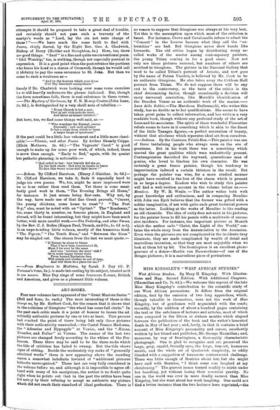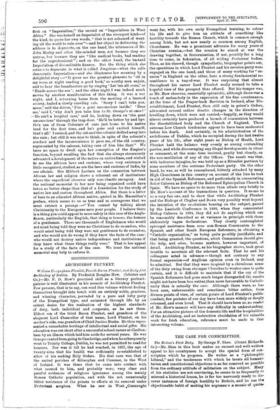MISS KINGSLEY'S "WEST AFRICAN STUDIES."
West African Studies. By Mary H. Kingsley. With Illustra- tions and Map. Second Edition. With Additional Chapters. (Macmillan and Co. 7s. 6d.)—We welcome this reprint of the late Miss Mary Kingsley's contribution to the scientific study of our West African possessions. It differs from the original edition, first by the omission of two long appendices, which, though valuable in themselves, were not the work of Miss Kingsley, but of gentlemen well acquainted with the coast; secondly, by the addition of about a hundred pages containing the text or the substance of lectures and articles, most of which were composed in the fifteen or sixteen months which elapsed between the publication of the book and the writer's lamented death in May of last year ; and, lastly, in that it contains a brief account of Miss Kingsley's personality and career, excellently written by her friend and publisher, Mr. George Macmillan ; and, moreover, by way of frontispiece, a thoroughly characteristic photograph. One is glad to recognise and see preserved the large, grey, candid, friendly eyes, the large, firm-set, humorous mouth, and the whole air of Quakerish simplicity, so oddly blended with a suggestion of humorous controversial challenge. There was little enough of Beatrice about her, but she might have said with Beatrice, "I think some star laughed at my christening." The gravest issues turned readily to mirth under her handling, yet without losing their essential gravity. No one in the world was ever in more deadly earnest than Miss Kingsley, but she went about her work laughing. One could not find a better instance than the two lectures here reprinted,—the first on "Imperialism," the •second on' "Imperialism in West Africa." She was herself an Imperialist of the strongest kind—of the kind, to quote her own words, "that is not ashamed of want- ing all the world to rule over"—and her object in delivering the address is to deprecqte, on the one hand, the UtteranCes of Mr. John Morley and other like-minded men, not because they are untrue, but because they are "like medical books, bad reading for the unprofessional " ; and on the other hand, the bastard Imperialism of discreditable finance. But the thing which she refusss to deprecate is what is called Jingoism—what she calls democratic Imperialism—and she illustrates her meaning by a delightful story :—" It gives me the greatest pleasure to sit in my room at night reading a good book,' as worthy men enjoin, and to hear the beanfeasters go by singing Let 'em all come,' or Hands across the sea ' ; and the other night I was indeed much moveu by another manifestation of this thing. It was a wet night, and I, returning home from the meeting of a learned society, hailed a slowly crawling cab. Sorry I can't take you, mum,' said the driver, I've a gent unconscious inside." Dear me,' said why don't you take him to St. George's at once?' "He ain't a hospital case,' said he, looking down on the gent unconscious' through the trap-door. 'He'll be better by and bye. He's one of them Colonials of ours just home to his native land for the first time, and he's gone and excited himself, that's all.' I retired, and the cab and the colonist drifted away into the rain ; but still it was nice to think, in spite of the colonist's conduct and the inconvenience it gave me, of the old country, represented by the cabman, taking care of him like that." We have no space to dwell upon her conception of the Empire's function, beyond recalling the fact that she always strenuously advocated a development of the native on native lines, and wished to see the African laws and customs, whose very existence is little recognised, studied, as are the laws and customs of India, by our officials. Her Hibbert Lecture on the connection between African law and religion shows a coherent set of institutions where the superficial observer only sees chaotic savagery. And the national memorial to her now being organised could have taken no better shape than that of a foundation for the study of native law and custom throughout Africa. But there is a letter of hers to an educated African native, quoted in Mr. Macmillan's preface, which seems to us so true and so courageous that we must extract a passage :—" You cannot by talking about Christianity to the Europeans save your people. I believe there is a thing you couldsppeal to more safely in this ease of the Anglo- Saxon, particularly the English, that thing is honour, the honour of a gentleman. There are thousands of Englishmen who would not mind being told they were no Christians to do so-and-so, who would mind being told they were not gentlemen to do so-and-so, and who would not do wrong if they knew the facts of the case : who-would not destroy native independence and institutions if they knew what these things really were." That is her appeal for a study of the facts of the case. We trust the national memorial may help to enforce it.























































 Previous page
Previous page